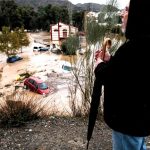As the countdown reached zero, the ground shook and flames burst from the launch pad, propelling the Shenzhou 19 spacecraft into the sky from the Gobi Desert. The BBC was granted rare access to the Jiuquan Satellite Launch Center in Gansu, witnessing the launch from over a kilometer away.
Onboard were three taikonauts—China’s term for astronauts—set to spend six months at the Tiangong space station conducting experiments and performing spacewalks as part of China’s efforts to gain experience for a planned moon mission by 2030. President Xi Jinping previously declared that advancing the space industry and establishing China as a space power is a significant ambition.
In Washington, concerns abound regarding China’s rapid space advancements. NASA chief Bill Nelson noted that the U.S. and China are in a “race” to return to the Moon, suggesting that Beijing’s intentions include territorial claims.
In the town of Dongfeng Space City, the space program is celebrated. Flag decorations, astronaut figurines, and vibrant displays greet those arriving for the launch. Hundreds gathered late into the night to send off their taikonauts, showing national pride as they celebrated the mission with songs and festivities.
The mission pilot, Cai Xuzhe, expressed confidence in the younger generation of taikonauts, including China’s first female space engineer, Wang Haoze. They encapsulate a new wave of space travelers poised to shape the nation’s future in extraterrestrial exploration.
He emphasized the responsibility they carry, stating, “Inspired by dreams that spark glory, we assure the party and the people that we are committed to our mission.”
Despite this excitement, challenges loom for China’s ambitions. Earlier this year, China successfully retrieved lunar samples and, in 2021, landed a rover on Mars, making it only the second nation to achieve such a feat.
However, rising tensions between the U.S. and China over these advancements raise the stakes in the ongoing space race, now focused not just on reaching celestial bodies but also on controlling resources found there.
While experts caution against viewing this as a competition, they recognize the implications. The Moon is believed to hold vast mineral resources, and controlling these assets could have significant economic ramifications.
Chinese officials have played down their achievements compared to developed nations, acknowledging the complexities of their ambitious goals while expressing determination to overcome challenges on the path to their next lunar landing.
As the rivalry continues to grow, there are concerns regarding how patriotism may be harnessed in this new era of space exploration. With increasing scrutiny on both sides, maintaining transparency while advancing technological frontiers will be essential for China, as they remain committed to establishing their footprint in space.
Credit: BBC News




